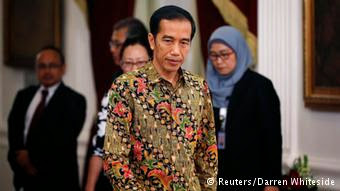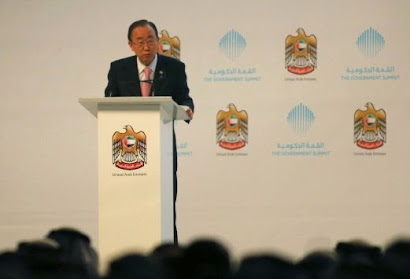 |
A man sits near a neglected colonial building in Kota Tua, North Jakarta,
in this file photo. (JG Photo/Afriadi Hikmal) |
Jakarta.
Once resplendent facades sagging in the tropical heat and empty shells of colonial-era
buildings are depressing signs that the old town of the Indonesian capital
Jakarta, once considered the “Jewel of Asia,” has suffered decades of neglect.
Palm trees
grow through crumbling windows in what was once the center of power for Indonesia’s
Dutch colonial rulers, and many buildings that are still intact lie empty,
stained grey by fumes from hordes of passing traffic.
But
Jakarta’s popular governor Joko Widodo, who has energetically taken on the task
of transforming one of the world’s most chaotic metropolises, has a new plan to
overhaul the old town and attract more tourists.
“It has to
be done, otherwise it is going to deteriorate,” said Goenawan Mohamad, a
well-known Indonesian writer and member of the group set up to regenerate Kota
Tua. “It’s about time.”
Nevertheless,
there is much scepticism.
Other plans
have failed and some fear that even if the latest makes progress, developers
might transform the area into a “Disneyland” full of garish malls rather than a
well-preserved heritage area.
Restoring
colonial splendor
Kota Tua,
in modern-day North Jakarta, was once a global trading center, where merchants
would arrive to buy and sell goods from across the Indonesian archipelago,
particularly spices sought after in Europe.
With its
whitewashed buildings and cobbled streets, the area for centuries made up
almost the whole of Jakarta, then known as Batavia, and was called the “Jewel
of Asia” by European sailors arriving after long sea voyages.
Jakarta has
expanded to become a city with a population of some 10 million, better known
now for its traffic jams than historic buildings, and Kota Tua has fallen into
disrepair, out of favor with the city’s well-heeled residents.
Some small
sections have been preserved. Cobbled “Fatahillah” square, the heart of the old
town and the most visited part, is in good condition and is packed out with
vendors selling trinkets to the small number of passing tourists.
On the
square, and also well-preserved, are the former city hall and a museum showcasing
Indonesian puppets.
But outside
this small area most of the buildings are in a state of serious decay.
Joko — who
was elected last year — and his supporters hope their initiative might at last
return some colonial splendor to Jakarta.
They believe
their plan stands a better chance of success than previous ones as they have
created an umbrella organisation with what they believe is the right mix of
people to oversee the regeneration.
The
consortium includes private firms, a former government minister and a heritage
group.
Crucially
they have the strong backing of the Jakarta authorities, who have pledged a 150
billion rupiah ($12.5 million) budget for the regeneration.
Previous
attempts suffered either from a lack of coordination between numerous different
players, or the opposite — just one group but a lack of resources, said Lin Che
Wei, chairman of the consortium’s board of advisors.
There are
signs that work is under way on some buildings in the area, and a visitor
centre and exhibition space for contemporary art are due to open next month.
The
consortium intends to renovate 85 historic buildings over five years, a program
it says will create 11,400 jobs.
Disneyland
fears
However,
some have expressed fears over-enthusiastic development might destroy Kota
Tua’s charms and transform it into an area full of ugly modern buildings and
shopping malls.
“Kota Tua
is a city, it’s not Disneyland,” said Ella Ubaidi, owner of a colonial-era
building in the old town.
Her
apprehensiveness stems from the profile of the consortiums’ board of trustees,
some of whom are from large Indonesian property companies.
There is
also a lack of enthusiasm among the public.
Some regard
Kota Tua, a district built by colonizers, as a symbol of repressive rule, and
there has been little interest among Jakarta’s citizens in maintaining it since
the Dutch left Indonesia in the late 1940s.
Nevertheless,
the plan’s backers are optimistic. They believe they can attract more tourists
to Jakarta, which lags behind other Southeast Asian capitals in numbers of
foreign visitors, as they restore Kota Tua to its former glory.
Agence France-Presse






















